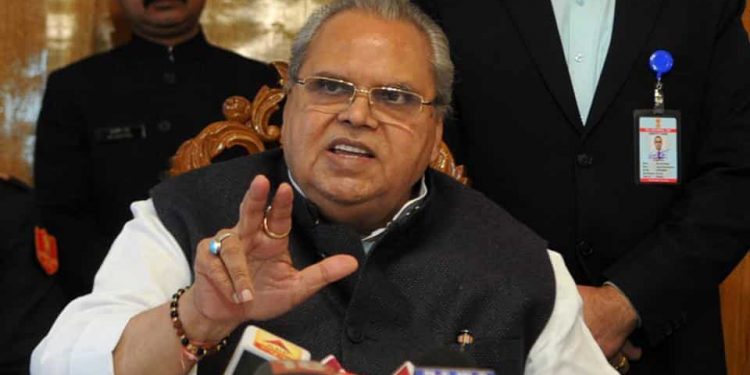Sanjeeb Panigrahi
The recent decision by the Governor of J&K, Satya Pal Malik,to dissolve the state Assembly, which was kept suspended after the fall of PDP-BJP coalition in June 2018, has again ignited controversy surrounding the Governor’s office. Malik is alleged to have not acted in violation of constitutional principles. He derailed the crucial constitutional process of government formation. Theoretically, he is authorised to do so; but his justification was curious and seems flawed when viewed through the lens of Constitutionalism. His reasoning behind his action includes, “impossibility of forming a stable government by the coming together of political parties with opposing political ideologies”, reports of “extensive horse trading”, and “the longevity of any such arrangement where there are competing claims of majority”.
While the Constitution grants discretionary powers to the Governor, they can be used only after examining facts of the matter. The Governor’s discretion should not be guided by apprehensions such as possible “exchange of money”. His doubts over ‘longevity’ and ‘competing claims of majority’ of the political arrangement were also unfounded. In a democracy, the numerical strength of elected members dictates government formation and not beliefs of the Governor with respect to stability. Although ideologically divergent parties BJP and PDP were able to form a government, the same logic is looking perverse to the Governor when the PDP and NC are coming together.
The Constitution prescribes an impartial Governor with deep sense of Constitutional morality and fair play though the power to dissolve the Legislative Assembly is neither explicit nor rooted in well-established convention
The Constitution prescribes an impartial Governor with deep sense of Constitutional morality and fair play though the power to dissolve the Legislative Assembly is neither explicit nor rooted in well-established convention. Article 174(2) (b) of the Constitution merely states that the Governor may from time to time dissolve the legislative assembly; but the Constitution is silent as to when and under what circumstances he will dissolve the House. This vital issue was echoed at the Constituent Assembly Debate, Mohammed Tahir (member of the Constituent Assembly) sought to amend the draft Article 153 to incorporate reasons for dissolution but was unsuccessful.
In a parliamentary system, the dissolution of an Assembly to address political instability warrants exceptional circumstances that call for such a decision. The circumstances are: i) When the chief minister enjoys the majority support and advises the Governor to dissolve the legislative assembly; ii) when the ruling party becomes the minority owing to defection of members; iii) when another party or coalition of parties is not in a position to form the government; and iv) when the Governor receives report that the constitutional machinery of the state has failed. India has witnessed many such instances of Governors recommending dissolution of State Assemblies citing reasons such as the state government not being run in accordance with constitutional provisions.
In recent times, the Governor’s office has suffered a decline in credibility from the politically motivated action of those holding the office. The apex court has deprecated such action in SR Bommai and Ors v Union of India and Ors (1994) and Rameshwar Prasad v Union of India (2006). But a Constitution Bench of the SC in the Nabam Rebia judgment (2016) ruled that Article 163 does not give Governors “general discretionary power” as is often misunderstood.
Governor Malik’s inability to take independent, judicious and constitutionally correct decision has brought his own susceptibilities to politically subservient ideas. It was exceptionally brutal that the coalition that unfolded in J&K was denied opportunity to take a shot at government formation. If the Governor had problems exercising his discretion, he had amplitude of guidance from recommendations of various committees and commissions. He should have applied a judicious mind to save the state from premature election or plausible judicial intervention as had happened in Uttarakhand, Arunachal Pradesh and Karnataka. Unfortunately, the political man hidden behind the Constitutional man won the battle giving rise to degeneration of democratic values and the sanctity of the institution. Our Governors must remember, there is no music so sweet to the Indian ears as the music of Constitutionalism.
The author is a Supreme Court advocate.







































